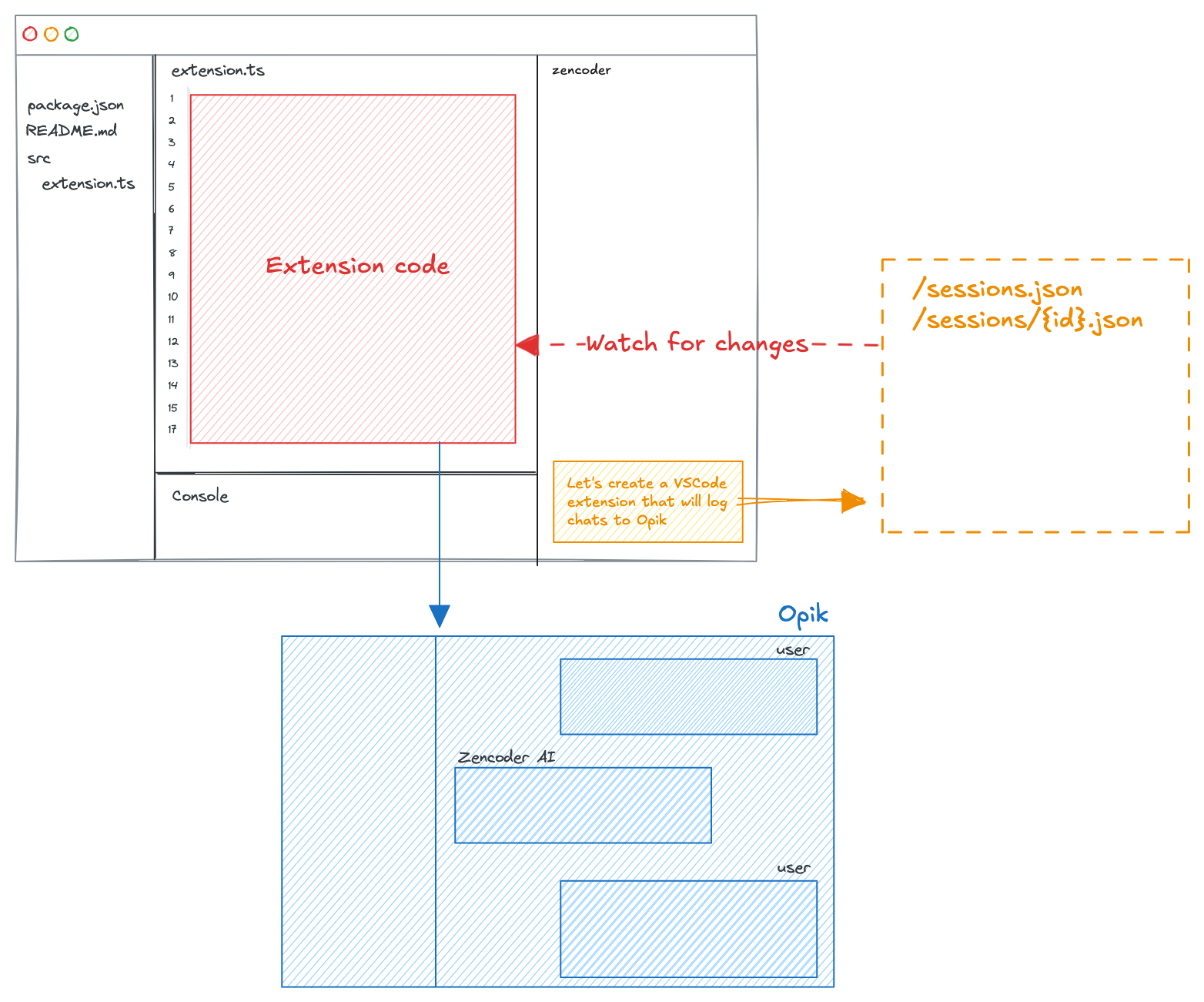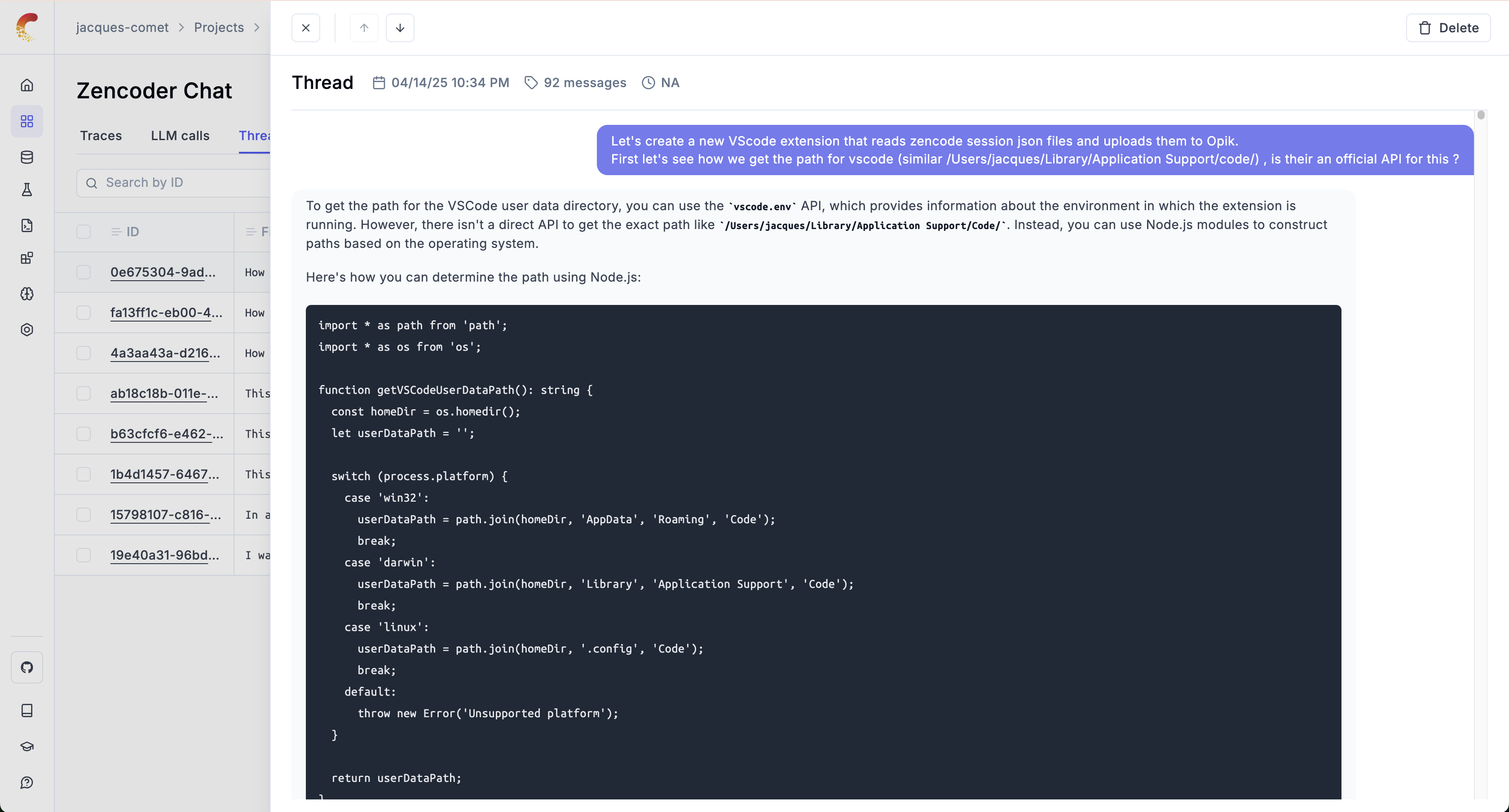What I learned vibe coding a VS-Code extension
As I've been trying out different coding assistants, I've been looking at ways of keeping track of the conversations I have with these assistants. I came across SpecStory but it only works with Cursor while I needed to save my chats with Zencoder.
I took on the challenge of building a VS-code extension that would log all my Zencoder chats to Opik. By the way if you haven't tried out Zencoder yet, I highly recommend it !
You can try the VS-code today, just search for
Opik - Chat historyin the VScode marketplace.
Figuring out how to build the integration
The first set in figuring out how to build the extension was to find where Zencoder stores it's chat history. Since you can load the most recent
chats from the Zencoder sidebar, I assumed these where stored locally somewhere. To find them, I first started a new conversation with a single user
message with 7eda9d8e and from the command line I ran:
find "/Users/jacques/Library/Application Support/code/" -type f -exec grep -l "7eda9d8e" {} +This allowed me to find that Zencoder stores the chat conversations in two files:
sessions.json: Stores metadata about each chat conversation (title, last updated time, etc)/sessions/{id}.json: Stores the list of messages for each chat conversation
Based on this finding, I could now plan the extension. It would be quite straightforward, every
5 seconds I would poll for changes in the sessions.json file and upload the corresponding chats
to Opik:
 .
.
With this plan, we can go ahead and create the extension.
Writing the extension with Zencoder
I'm not a very good Typescript developer, it only makes sense to use Zencoder to create the extension. After some basic prompting, I had a plan for the architecture of the extension. It would be a sinmple loop that would run every 5 seconds that would:
- Get a list of the chat sessions that have been updated since the last loop
- Fetch the chat messages for each session that has been updated
- Convert the chat messages to the Opik trace format
- Log the traces to Opik
This was quite straight forward and a first version was quickly implemented. I did run into an issue related to some messages being logged more than once but by asking Zencoder:
Some chat messages are logged more than once, review the code and suggest some reasons for this as well as ways to figure out the root cause.
Zencoder was able to identify a missing continue statement that once added resolved the issue.
Vibe coding
"Vibe coding" is a recent term that refers to a development approach that heavily relies on LLMs, typically achieved by using the "Agent" mode in Cursor, Windsurf or Zencoder.
While I tried "vibe coding" at the beginning of the project, I quickly reverted back to the chat mode. Having an LLM update files for you is convenient but I quickly lost track of the changes being made and new issues where popping up right left and center. This is not a Zencoder issue, I had the same issues with Cursor and Windsurf.
The chat mode in all the AI coding agents provides the perfect balance between usefulness and control. Having a chat that has access to your full codebase for context is incredibly useful and avoids the painful copy and pasting into Claude of ChatGPT.
Using the extension
You can find the Opik - Chat history extension
in the VScode marketplace. To install it, simply ssearch for Opik - Chat History in the VScode marketplace
and click install.
Once installed, you will need to configure it by specifying your Opik API key. For this, navigate to the
VSCode settings page and search for opikHistory.APIKey.
Once configured, each Zencoder chat will be logged to the Opik platform:
 .
.
References
If you've enjoyed this article, I recommend checking out:
- SpecStory: SpecStory is a much more polished implementation of the ideas in this post
- Zencoder: An AI coding Agent you can directly from VScode or Intellij - Why would you download a whole new IDE ?
- Opik: An LLM evaluation platform that allows you to both track all your LLM calls and evaluate the performance of your LLM applications.